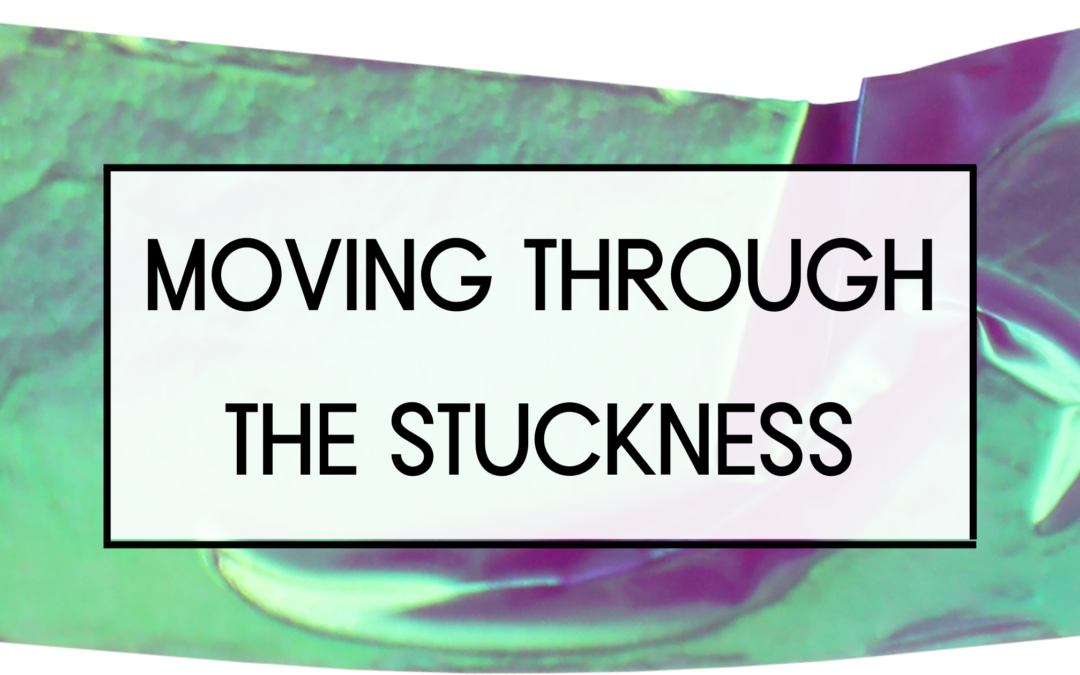This blog post originally was shared with my mailing list for The Tending Letter. You can subscribe to my newsletter at the bottom of the post.
We don’t plan to get stuck.
Sometimes, we have the best intentions, we get enough sleep and drink enough water, we set a clear goal, we schedule in time to work on our projects, and we still struggle to make progress. Sometimes we feel so caught in the stuckness that we forget what progress is supposed to look like. We spin our wheels, devolve into negative self-talk, and give up.
Right now I’m feeling stuck with professionalizing myself via my writing. I feel like I have very smart ideas in my head that can help to change the world of productivity for the better, but when I try to get them on paper I just rewrite versions of the same ideas over and over.
When this happens, my internal critic pipes up, saying things like ”You literally have an MFA in Creative Writing and a PhD in Rhetoric! Did you already forget how to write?” and “Famous people are going to write about this before you and no agent or press will pick you up because you took too long.” These are some of my own limiting beliefs around my progress as a Productivity scholar, but I’m sure you have your own versions of negative self-talk that you stab yourself with when you feel stuck.
When I find myself wallowing in negative self-beliefs around my writing or my productivity, it usually means I’m feeling stuck. Thankfully, I’ve developed a few key tools that help me get back to forward progress with my project and my mood.
Techniques To Move Through the Stuckness
Make Sure I’m Working on a Specific Task, Not a Large Goal
Whenever I feel confused, it’s a good sign that I’m not sure what I’m actually supposed to be doing! Even if the task I’m working on is broad (brainstorm, daydream, research), it still helps me to focus my attention away from large, abstract goals (“write your essay” or “develop your business”). When I narrow down my focus to a tangible task, I set a more realistic mini-goal for myself. You can learn more about this approach in my blog post about “The Goldilocks Approach to Productivity.”
Journal about the Stuckness
I adopted this method when I was writing my dissertation: when I feel stuck, I grab a pen and write down a question for myself like “what’s the obstacle right now?” or “why can’t I figure this out?” I take around 5 minutes to write down my answer and I always learn something interesting. Often, I learn that I feel confused or overwhelmed and I can identify what I need to move forward.
Set Up Accountability
I know that I thrive when I have external accountability, whether that’s co-working or co-writing on Zoom with friends or telling my coach that I will complete a goal by our next session. For the current essay I’m working on, I set myself up with co-writing sessions with my friend Chris (who has a memoir coming out this year!) and I scheduled a 1-on-1 writing coaching call with Siloh Radovsky at the end of the month. My co-writing sessions with Chris will help me to do focused writing and my coaching call with Siloh will ensure that I have a draft ready to share with her before our call.
Talk about It with A Friend or Coach
Journaling can be a helpful tool for figuring out answers to problems, but sometimes talking to a friend or colleague can offer a fresh perspective. I talked to my coach Kate Snowise about feeling stuck with my writing and she encouraged me to approach my essay as if I’m writing a blog post. I’ve written over a hundred blog posts! I can do that if I relax the pressure on myself. I also regularly talk to my Sweetie about my ups and downs with work and writing, and I’m really grateful for the ways Kris cheerleads me when I feel down.
Be Compassionate with Myself When I’m in the Stuckness
Sometimes moving through the stuckness is painful. Sometimes feeling stuck is the result of things that are difficult or impossible for us to change on our own, like mental or physical illness, systemic and supremacist oppression, or lack of financial or legal stability. Sometimes our stuckness will pass with time, such as with grief or healing, and sometimes feeling suck will force us to alter our paths in ways we never imagined or wanted.
I try to be compassionate with myself when I struggle with my own stuckness. One of my compassionate actions is speaking kindly to myself. In response to the negative statements I shared above, I might tell myself “I did not suddenly forget how to write…I’m really good at academic writing, but I’m learning how to write in a new genre. Even if others publish before me, my audience is specifically interested in my take.” You can learn more about limiting beliefs in my blog post “Limiting Beliefs: Choose Wisely.”
Newsletter
Sign up below to access my free newsletter, Tending with Dr. Kate Henry.

